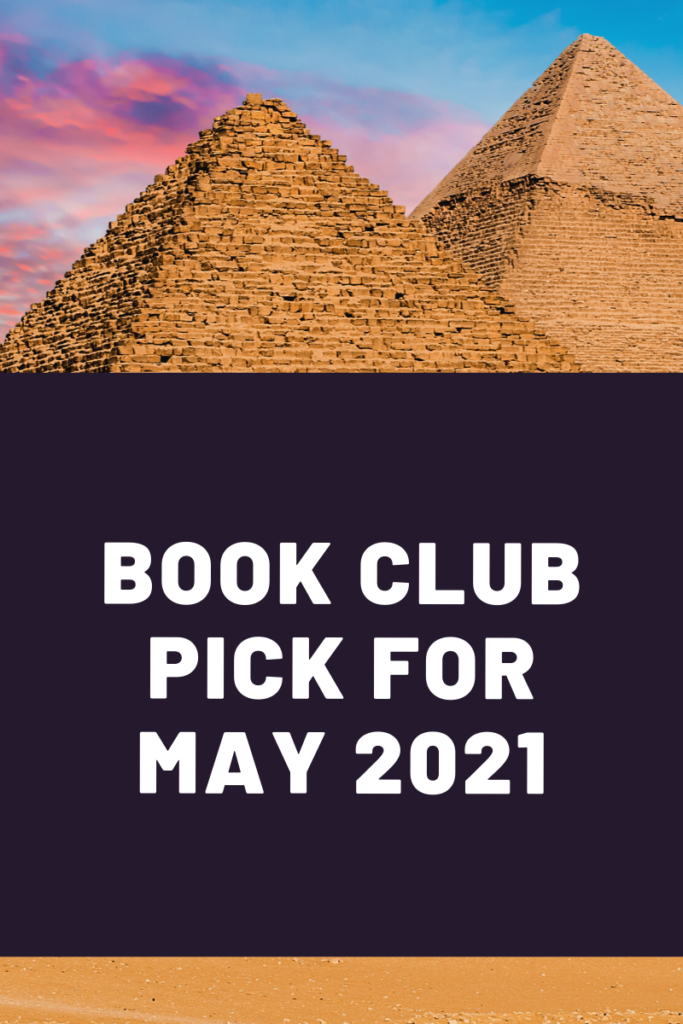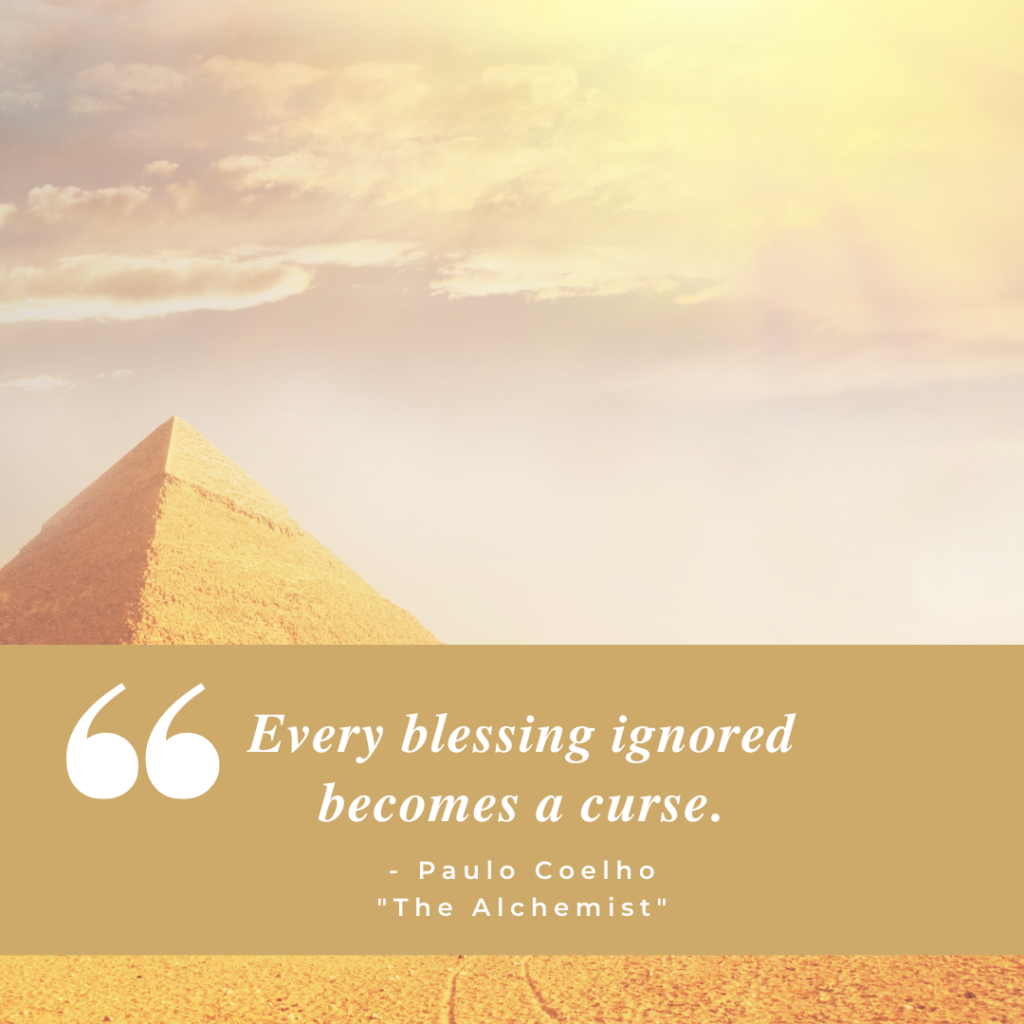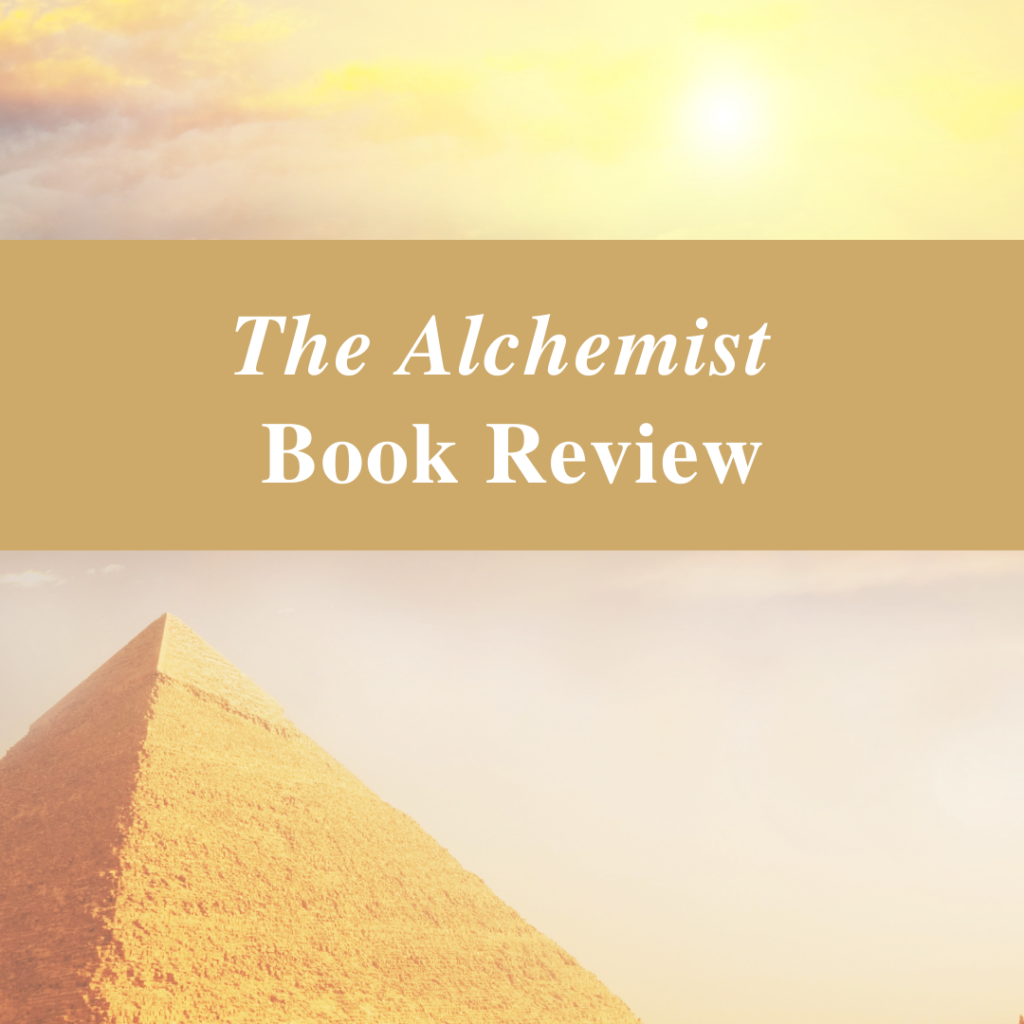If you are new here, welcome! This book was the May 2021 pick for the Read with Sarah Book Club for Intermediate to Advanced English learners and also the first book we read together! Not a member yet? You can join for free HERE. All the discussions and vocabulary lists for this book are filed in the Guides section.

The Alchemist is a beautifully written fable about following your dreams. It is simple and yet profound. While the author Paulo Coelho has written many other wonderful novels, this one endures as effectively his masterpiece.
You can see my review here. The transcript and some notes about vocabulary are below the video.
Transcript:
Have you ever been on a journey that changed your life? Maybe you went somewhere new. Maybe you learned something new.
It’s part of the human condition to desire to see new things, learn new things and strive for more.
In this video, I am going to be reviewing The Alchemist by Paulo Coelho which the cover tells us is a “fable about following your dream.”
Hello! My name is Sarah Rocha Coelho. Welcome to my channel for Intermediate to Advanced English learners who want to use their English with greater clarity and confidence. If you are looking for a challenge, and you are ready to use literature to take your English to new creative levels, then this is the place to be.
Literary term: fable
So I said that this novel is a “fable.” It’s written on the front cover that it is a “fable about following your dream.”
So, what is a fable? Well, it’s a literary genre or type. So people often think that genre means, you know, the content like horror or romance or, you know, the subcategories that come from content. But genre can also be a subcategory that comes from technique and a fable is really a structural technique for writing a story. It’s usually a very simple kind of story.
But, if we look at number two, it teaches a clear moral message or practical lesson. So in The Alchemist there’s a clear message of, you know, the value of chasing your dreams.
If we look at number three: what is a fable? Well, it usually uses animals that have been anthropomorphized. Oh my goodness! There’s a word! And anthropomorphized means “given human qualities” so in a fable we’ve often got animals that talk. The animals are the characters. Sometimes, plants, nature or objects are used as in The Alchemist. There are no talking animals but there is kind of a personification of nature. Nature is given human-like qualities.
Number four: it’s often quite short and simply written.
So all of these things together make it a fable. And The Alchemist is a good example of a fable. Animal Farm by George Orwell, which is next month’s book. That’s considered one of the most famous political fables and it certainly fits within the genre in that it is about animals and the animals have very definite human qualities.
The book The Alchemist was our pick for May in the Book Club (see the link in the comments below) so you know what I’m talking about.
Actually, it was the first – not just our pick for May – but it was the first book that we read together in the Book Club.
It has a really special significance in my life for two reasons.
Number one, my life has mirrored the book to an extent, in an interesting way.
And number two, I’ve read this book many times and I have taught it as a High School English Teacher (or Secondary School English Teacher as we say here in Scotland).
I’ve taught it a few different times and each time that I have read it or taught it to a class, I’ve found something new in it or I’ve learned something new or I have been able to reflect upon something new and to me that is the mark of a great book!
Author:
Whether or not it is “a great book” is something that people hotly debate.
It certainly was not a hit when it was published in 1988. It was not until it was translated from Coelho’s native Brazilian Portuguese to English that it slowly started to take off and over time, it’s been translated into 67 different languages and has become a global phenomenon selling more than 65 million copies.
The author also didn’t have an easy path to success either. Paulo Coehlo was born in Rio de Janeiro, Brazil and wanted to be a writer from an early age – which was against the wishes of his parents who had other plans for his life. He suffered immensely with his mental health in his teen years. At his parent’s request he enrolled to study law and abandoned his dream of being a writer. However, he dropped out after only one year.
One of the characters in the story acknowledges that:
“…every blessing ignored becomes a curse…“
which I certainly feel is an important part of the lesson (or one of the lessons) of the novel and one that the author no doubt learned himself as he worked to overcome the challenges in the way of launching his career as a writer and really using that blessing to its full potential.
Plot:
The novel follows a boy called Santiago as he leaves his role as a shepherd and heads off on an epic adventure in search of treasure. It is a story of an outer and also inner journey that Santiago completes as well as the outer and inner treasures that he finds.
And it is therefore a story of self-discovery and coming home and is therefore something that people can relate to in a really powerful way.
My connection:
This is a bit of a detour from the book review but to truly explain my thoughts on the book, I first need to tell just a little bit of my story.
I mentioned that I feel a sense of my life mirroring the book and it’s something that I’ve not only noticed myself but I’ve had other people randomly say to me, “Have you noticed this?” when they’re talking about the book.
So what’s the connection? Well, I went on a journey and I discovered new people and new places and I rediscovered people and places that I thought I had left – in different ways – for good. And there are other direct connections to the plot which I won’t go into because I don’t want to give any spoilers away.
But in 2014, I’d been living in Vancouver, Canada for 14 years. I’m originally from the U.K but I went to Canada on a scholarship while at university and, after my degree, I stayed.
In 2014, it had been a few years since I’d had an opportunity to spend lovely time with my parents and they invited me to meet them on holiday and we decided to go to Brazil where we’d lived as a family a little bit when I was young.
As I boarded the plane, I absolutely had a strong intuitive knowing that I would meet someone and I remember bargaining with the universe and thinking to myself: “Well, okay. That’s great. That’s exciting. This feeling is exciting but they are Canadian, right? Because I am not leaving Canada! Or at least – you know – if they are in Brazil then they were planning on coming to Canada.”
And I was just so fixed on this idea of “Oh it would be great to meet someone but I don’t want my life to change and I’m not moving from Canada!”
As I arrived into Sao Paulo in Brazil, tired from the flight, and a little bit bedraggled, I again had this immense feeling that I was going to meet someone.
And there was a voice in my head that was saying, “Come on – you know. Smarten yourself up. You’re so bedraggled from the flight.”
And I just was so resistant. And I was kind of arguing to (with) myself that this feeling is just ridiculous.
Ridiculous or not, there he was in the airport – the man who just a few months later would became my husband.
We’ve been married for six years now.
The story of how all of that fully came about is quite miraculous and one that I’ll perhaps share at another point in another video.
But getting back to that holiday in Brazil… while I was in Brazil, visiting in 2014, that was when I read The Alchemist for the first time and I had this sense while I was reading the book that it wasn’t so much teaching me something new, but it was definitely reminding me of what I’d learned.
So it felt like a pause in my life and there were parts of the book that were just directly speaking to the experience – this kind of magical experience – that I was living through in the moment.
There’s a common story structure called “The Hero’s Journey” popularised by Joseph Campbell in which story stages are described and the first few steps in that kind of template of “The Hero’s Journey” are:
1. A call to adventure.
2. Supernatural help
3. Crossing the threshold – which is when the hero or heroine steps out on a journey that changes everything.
And as I read this book The Alchemist I felt like I was in the stage of receiving the intuitive guidance.
And I felt like I was stood on the threshold of a new life. I felt like I was being given a moment to reflect before crossing the threshold and starting a spiritual journey that would profoundly change my life… not just spiritual but you know physical… lots of different changes.
And I felt like the book was helping me feel into the idea that this journey was starting and that it would take a few years to play out and that more importantly I would need immense courage and faith in my intuition to be able to take the huge leaps that I would need to take.
I was right. Only a few short months after that holiday, I took a huge leap of faith and moved from Canada to Brazil and we got married a few weeks after and our son was born and we lived in Brazil for two years.
And then we moved to my native U.K. And coming back to the U.K was something I never envisaged happening. I also changed at that time from being a Teacher of English as a Second Language back to being a High School English literature teacher which was what I originally trained in. And one of the first books that I chose to teach was of course The Alchemist. And all these changes happened in just two and a half years so it was really truly just a profound journey of personal transformation.
So I consider The Alchemist to be one of the most relatable books that I’ve ever read.
Pilgrimage:
This idea of going on a physical journey to initiate a spiritual journey forms the core of the novel.
Many global religions recognise taking a journey as part of a personal spiritual awakening or part of the path towards enlightenment and such journeys are called pilgrimages. Those that undertake them are pilgrims.
So for example Muslims undertake pilgrimages to visit Mecca.
And the author himself, Paulo Coelho, has stated that his pilgrimage from France to Santiago de Compostela in Spain – as a Catholic – was a deep source of inspiration for him, helping him connect with the power of the dream of being a writer that he had kind of placed on hold for a while.
Criticism:
What I loved about the book – the fact that I felt it gently guided me, that it reminded me of the power of intuition – those things are aspects that many people have criticised and have said that it’s a bad thing that this is a little bit more like a self-help book than a piece of literature.
And I would say that I like to keep an open mind about all forms of writing. Does it really matter if this has aspects of being a self-help book as well as being a story, a piece of literature? Can it be both? Does it matter that the philosophical concepts are quite simple?
For me it doesn’t. I think they still really have deep value.
But one thing that I would agree with with some of the negative criticism of the book, and I certainly recognise it the more I read it, is the portrayal of women within the book.
I’ll admit, it is not something that I really strongly paid attention to in my first reading because of what was happening in my life I was so swept up in how beautifully written this book is and how much it spoke to me.
But certainly in other readings, and when discussing it, I have absolutely stopped more to consider: why don’t the women of the story get to go on the same types of adventures? What about their hopes and dreams of their own? What about their own brave leaps of faith within the story?
At one point, the idea that women don’t have their own personal legends to fulfill is explicitly stated through one of the characters and so I just can’t review this book without stating that the extent to which the female characters exist only through the male protagonist is, for me, deeply problematic.
If you look at this book from that perspective, then there’s quite a bit that you could get incredibly annoyed about and you could do a deep dive into that for sure.
However, I still see this book as worth reading, worth studying, worth discussing… it’s just that in doing all of those things there’s definitely a caveat of the issue of how women are presented and how that is for me essentially… you know… a deep flaw within the novel… but it’s one that has been interesting to bring up in conversation and to have some… you know… quite deep reflection on that. So while I would certainly agree with that aspect of the negative criticism of the book, I don’t really agree that it’s not a wonderful novel because it in some places feels simplistic or feel a little bit like a self-help book.
Overall:
Overall, I feel that The Alchemist has earned its place as a beloved masterpiece. It is a beautifully written book with an amazing propensity to initiate self-reflection
It’s a book that deeply irritates me as well as deeply uplifts and inspires and, like I said, my life has been mystically intertwined with some of the themes and ideas within the book.
If you would like to join the discussion of books like The Alchemist then you might like to join my Facebook Book Club where we read a great piece of literature each month.
It’s a wonderful place to get inspiration and motivation to read English and speak about what you’ve read and write about what you’ve read.
You can find past vocabulary lists for books we have read in the files section there too.

To hotly debate = to argue about somthing.
Bedraggled (adjective) = dishevelled or untidy.
Caveat (noun) = a warning or proviso of specific stipulations, conditions, or limitations.
Disclosure: This page contains affiliate links. If you purchase something using one of these links, I will be awarded a small commission (at no extra cost to you or the author of the book).
